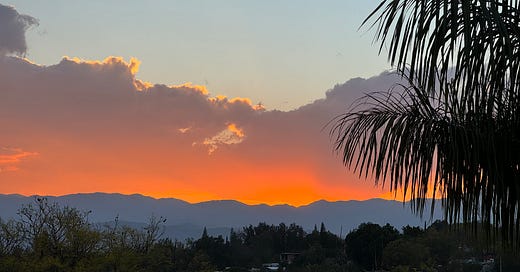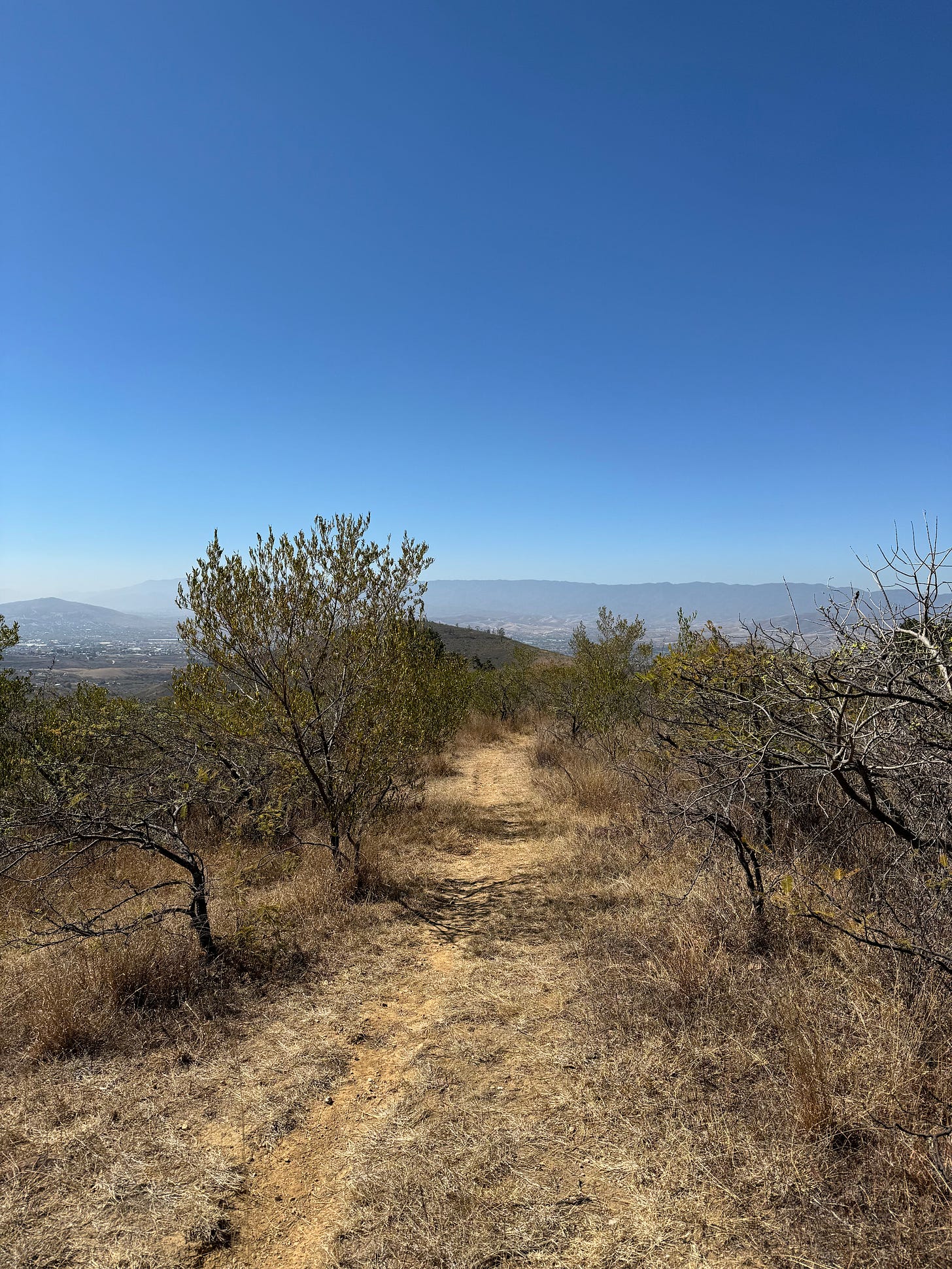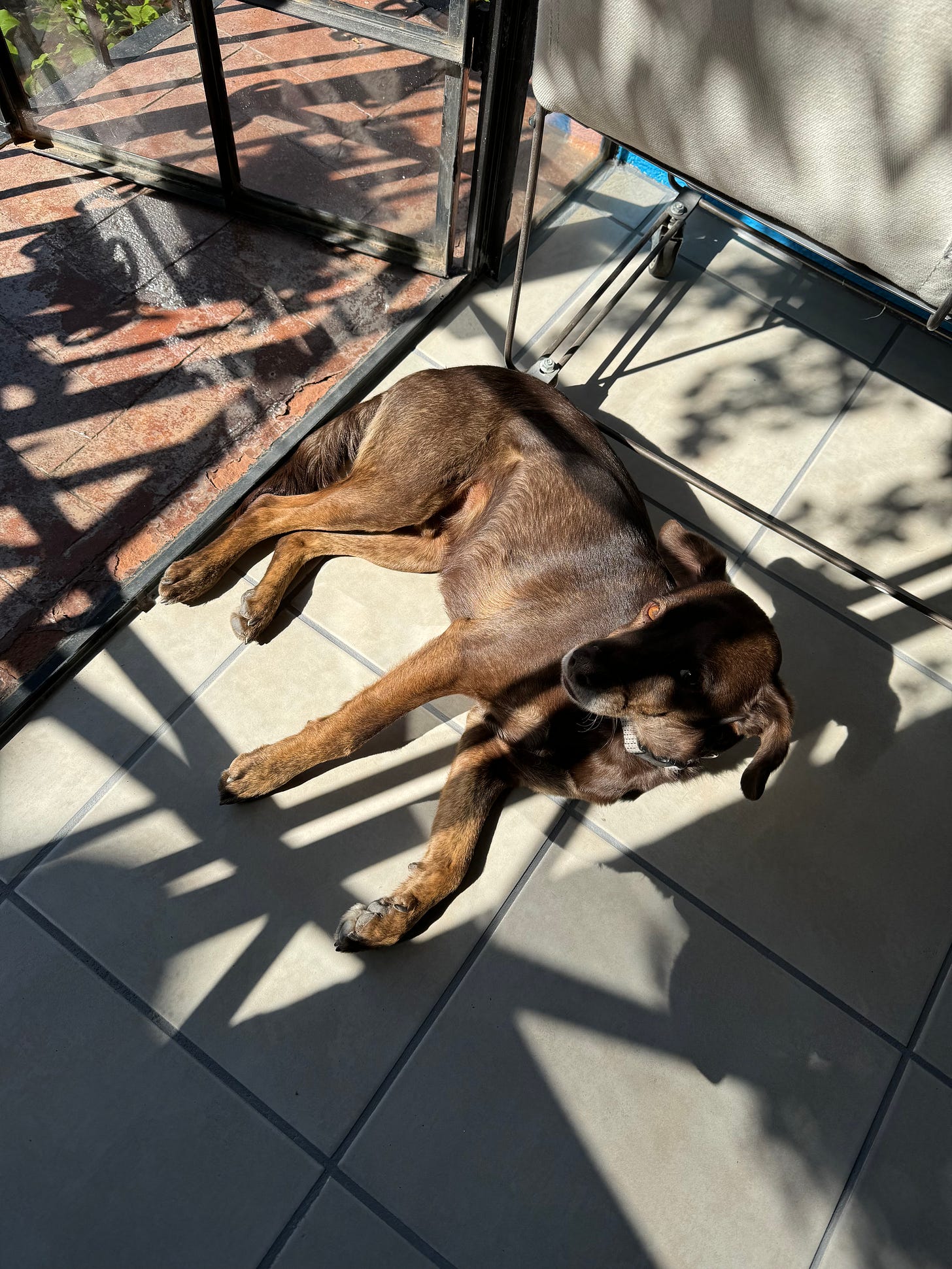Earlier this week I received a note from one of my newly-paid subscribers, Anthony, along with permission to share his message. Anthony wrote:
"I started reading your posts/stories during the pandemic. Was it called Pandemic Kitchen? They felt comforting to read. I'm excited to see you make such a big change. I have never been to Oaxaca, but I can only imagine how beautiful it is. My wife and I made a big change; after living in the Midwest for 40 years, we moved to the Bay Area for our jobs. Sometimes you just have to make a change."
We moved to Oaxaca just over five months ago, embarking on an adventure that upturned virtually every aspect of our lives. Many of you have been reading about our time here since I first launched this Substack but, even if you’re a more recent subscriber, it shouldn’t be a surprise that it’s been a pleasant, incredible, and vexing mix of successes and challenges. We’ve traveled around locally, renovated, adopted two dogs, started hosting paying guests, hired a ‘fixer’ to register our car, fought bitterly with hordes of ants, and much more besides.
Now that five months have passed we’ve also begun to settle in. Our command of Spanish has substantially improved (although we certainly have many more years of learning and study ahead of us), we’ve made friends, and our house is starting to feel more like a home. But as we’ve experienced so much, so quickly, it feels important to devote some time to meaningfully thinking about what this all has meant so far. Anthony’s incredibly kind message proves to be an excellent prompt.
A Big Change
One of the scariest things about living in Oaxaca has been the feeling that we might be here forever.
I always pictured myself living in New York for my entire life, and I absolutely considered myself to be in the “New York or Nowhere” camp. Part of that feeling came from having lived in quite a few places over the years: New Hampshire, Boston, Chicago, Washington D.C., and (briefly) Montana. Each move represented a tectonic shift in my life and brought with it enormous change. But when we moved back to New York in 2017 it felt far more permanent. I was so thrilled to be home again, so in love with the idea of the city, I truly did not see myself leaving. To my great joy, Andrea also fell hard for New York. We were home.
Now, when Andrea and I stand on one our balconies and look out over the small slice of our village the view presents, when we sit on plastic chairs on a dirt road eating cóctel de camarones, or when we walk the bustling sidewalks of Oaxaca de Juárez or drive into a village known for an ancestral craft, we sometimes turn to each other and say, “how could we ever live anywhere else?”
It’s terrifying! I felt this type of permanence before in New York and ultimately chose to leave—and this is true, but also sounds ridiculous—so that we could pursue adventure somewhere beautiful. Will we come to feel the same way about Oaxaca?
It feels sort of shocking, but I think we won’t, and not because we’re trapped here. It would be a monumental pain to move away from Oaxaca, simply on a practical level, but we could do it. There could come a time when we feel so homesick we might be willing to give up the incredible house we’ve come to occupy, the village we’re coming to love. But we embraced change—big change!—and it seemingly embraced us back. I don’t know if anywhere else could provide us with exactly the same type of stir-fry of culture, experience, and personal discovery we’ve found here.
I think the willingness to stay somewhere so different, to become something different, might be what differentiates an expat from a traveler. The traveler enriches their life with the joys of other places, but the frame is one of impermanence. Travel is defined by the fact that it will eventually end, and that’s particularly true of tourism. Being an expat, though, seems to be a more permanent state of mind. You travel with the knowledge that you may never truly return to the place you’re from, and not just because some sort of unhappiness drove you to find a life in another place. Expats return to their countries of origin all the time. But, I think the willingness and ability to thrust yourself more permanently into the unknown indicates you’re categorically a different type of person. Not better or worse; just different.
A Wilder Place
There’s something very interesting about first living somewhere where nature is contained, planed, and executed, and then transplanting yourself to a place where nature is the default. Our town is an oasis of green surrounded by rocks and trees. When you enter the town you feel as if you are going into a place from outside. In New York you are enveloped, constantly. Even in the grand, wild places you’re very aware they have borders beyond which lie concrete and steel.
New York is a beautiful place, both naturally and because of the influence of people. The grandness and intricacy of the city’s architecture—both in Manhattan and downtown Brooklyn where the skyscrapers are, and in the broader, lower areas in the outer boroughs—create stunning opportunities for creativity and visual complexity. New York’s sprawl also means it also encompasses a surprising range of biomes. Upper Manhattan and the Bronx offer riverside cliffs and bays, Brooklyn and Queens have oceans, dunes, farmland, and forests, and even Staten Island has a lovely state park (if you bring yourself to go out there).
New York, though, is intentional. Its wild places are deliberately wild. It’s built, contained, manicured (sometimes). Oaxaca’s beauty is in many ways less intentional. It would be a major disservice to describe this place as if it’s undeveloped, or to portray the people who live here as if they’re simple and uneducated and haven’t been shaping and influencing this place in meaningful, sophisticated ways for over a thousand years. Oaxaca also has plenty of parks, botanical gardens, plazas, and other places intentionally designed to be beautiful and to highlight nature. But where New York’s sprawl is met with the creep of other places, the city Oaxaca de Juárez and the state’s towns and villages border terrain that is much wilder.
It’s easy just to stay comfortably in your house here in Oaxaca, but we could be somewhere quite unlike our home in a mere ten minutes. There is a feeling of freedom here I haven’t experienced before, and I increasingly feel the pull to drive further and see more.
A Beautiful Place
Oaxaca is the most beautiful place I’ve ever lived.
It’s unnecessary to compare Oaxaca against the many cities and states in which I’ve resided. They all had their charms and their beauty, in their own ways. But this is the first time I’ve ever lived anywhere so abundantly, obscenely gorgeous. It’s also not just because we’re so in love with our house, which has granted us a level of comfort and control over our environment that we’ve never had before. It’s Oaxaca itself, Mexico. It’s swaying trees and barking dogs, wind kicking up dusty plumes from dirt roads. Orange twilight horizons and the shadows of circling birds of prey as they fly directly in front of the sun. Enormous grasshoppers and the smell of corn toasting on clay over a wood burning fire.
Oaxaca is so beautiful it makes me want to be more intentional with my Instagram feed. Not for likes or clout, but because it’s so absurdly gorgeous that it makes me feel like more of the world should see this place.
Active Participants
As Anthony wrote in his note, sometimes change is needed. I think it can be hard to recognize that, though, especially because life forces change on us all the time. Sometimes it happens when we want it to, or need it to, and sometimes it’s abrupt and unpleasant and destructive. Being a therapist for many years taught me that more often than not change happens gradually, like water dripping on a stone, gradually wearing a path in something that looked and felt eternal. It’s so slow you don’t even realize it’s happening.
Five months in and we’re starting to feel less like spectators and more like participants. We’ve begun building a life here, one which has changed our expectations and our rhythms. I think a huge reason is because our Spanish is improving.
Edgar has, and continues, to help us enormously. When we have to do something complicated with the phone he’ll make the call for us, and even though we’ve thanked him profusely I’m not sure he quite understands just how much we appreciate it. But having a greater command of Spanish also means we are developing a much deeper appreciation for Oaxaca and Mexico. I think we could coast by on just English, relying on others to help us out when we really got into a jam. But taking the time to learn the language doesn't just help us learn more about the culture here, I think it also signifies to the people around us that we’re trying to integrate.
We haven’t even been here for half a year yet. If this is what it’s like now, what will it be like in a month? A year?






